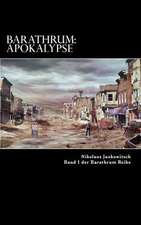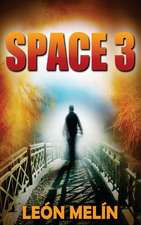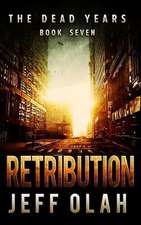The Last Harbor
Autor George Foyen Limba Engleză Paperback – 31 mai 2001
The acclaimed author of The Shift and Contraband delivers a brilliant new novel set in an edgy future where nothing is more dangerous than a dream....
Slocum had it all: the perfect family, the perfect home, and the perfect job with X-Corp Multimedia -- a major producer of interactive virtual-reality entertainment. In a world divided between protected enclaves of luxury and blighted, decaying landscapes, the ubiquitous 3-D telecasts over the Flash hold millions in thrall with their packaged, programmed dreams.
Once Slocum helped devise those dreams, until his career at X-Corp self-destructed and with it his marriage. Now his world has shrunk to a tiny sloop berthed in the dingy harbor of a dying New England seafaring town, where the main attraction is a virtual-whaling theme park. In his solitary cabin he studies the legendary Smuggler's Bible and dreams of sailing off to a life of freedom.
Then an enormous ocean liner docks beside him in the harbor: a floating palace of glittering wealth and mystery, with a single enigmatic passenger, a woman who restlessly walks the decks as if unable to leave the ship. For Slocum -- rejected by his wife and daughter, hounded by his vengeful employers, harassed by the town police, his credit cut off, his funds running out -- the alluring woman soon becomes his sole hope of escape. Only by learning her terrifying secret can he free her from her gilded captivity ... and realize his own dreams -- which, in a world of mass-produced fantasy, is the most forbidden pursuit of all.
Preț: 142.91 lei
Nou
Puncte Express: 214
Preț estimativ în valută:
27.35€ • 29.72$ • 22.99£
27.35€ • 29.72$ • 22.99£
Carte tipărită la comandă
Livrare economică 17-23 aprilie
Preluare comenzi: 021 569.72.76
Specificații
ISBN-13: 9780553379310
ISBN-10: 0553379313
Pagini: 288
Dimensiuni: 159 x 234 x 21 mm
Greutate: 0.33 kg
Editura: Spectra Books
ISBN-10: 0553379313
Pagini: 288
Dimensiuni: 159 x 234 x 21 mm
Greutate: 0.33 kg
Editura: Spectra Books
Notă biografică
One of today's most distinguished science fiction writers, George Foy is the author of five acclaimed thrillers and two well-received literary novels. He was awarded a National Endowment for the Arts fellowship for 1994-95.
Extras
Slocum stared at his diesel engine.
It lay cold and inert in the cave of his engine room. The glow of the engine-room light evoked a smug shine from the arcs of small drives: the alternator, the fuel pump. It left shadow behind the metal casings that protected the cylinders, and beside them, like succubi nestling closer to protect the addiction they themselves had both crafted and subverted, the injectors and pipes that fed his pistons the oil without which they could not fire.
Slocum picked up a wrench and gave a quarter-turn to the banjo nut clamping the fuel pipe to the top of his Number One fuel injector. Today the engine reminded him of some brute and overwhelmingly stubborn animal that had decided to lie down and that no amount of kicking or pulling or even whipping could persuade to move. On other days it had reminded him, respectively, of a prehistoric beast; of a coded relic from a murderous civilization; of an instrument of sexual torture from an inquisition no one remembered. Always such images were dark and ugly. Always they drew on a rage that built up in him in inverse ratio to his ability to fix the engine. The best he ever got, after cleaning fuel lines, reaming the filter, disassembling the part of the injector he could get to and steaming that out, was a half hour of smooth running. Then the injector would seize up, the flow of fuel would dwindle by half, the engine would run rough. Eventually it would stop dead.
Slocum wormed his torso out of the engine hatch. The rage was still dark in him. He threw his wrench at the deck so hard it bounced. He glanced at the clock on the forward bulkhead. It read 08:48. The Mechanic was almost two hours late. Slocum felt like picking up the wrench and throwing it down harder; so hard it made a hole in the deck, rocketed into the bilge below, and stabbed through the fiberglass skin of his hull, letting in the harbor water to fill his boat. The water would be cold and laden with poisonous chemicals and it would sink everything he had left at this point but at least it would flow, move, create change. It did not matter to Slocum in this second if the change was good or bad. What maddened him was the feeling of being stuck, unable to go forward or backward.
He climbed the four steps to the sloop's cockpit and peered up and down the length of Coggeshall Wharf to where, in the fog that lay thick on this harbor before noon, the dock's structure got confused with the buildings of Town.
No sign of the Mechanic or his brilliantly lit truck. It did not surprise him. The Mechanic had shown up only once, the very first time, ten days after Slocum had first e-mailed him. He had told Slocum what was wrong with the injector and vowed to return the following week with the spare part he needed. He did not show up that week, or the next, or in the weeks after that. Since his first visit Slocum had e-mailed and telephoned almost daily and never succeeded in talking to the Mechanic again; only to digital mailboxes that took his messages and made machine promises in return. On the two occasions Slocum got a message back, and a response to his reply, the Mechanic had set up a time for his next visit, and then failed to turn up or even explain his absence.
He was the only mechanic in Town or in the surrounding area who condescended to service the small marine diesels, made by the MarDyne Corporation, of the type that powered Slocum's sloop.
The harbor wind was damp and cold on Slocum's shoulders. He went below again. He picked up a box of rusted parts the Mechanic had left on his first visit. They were not MarDyne parts but bits of injectors of different makes. The idea had been that Slocum would save the Mechanic time by trying each and every part that might possibly fit his injector, in case it came close, in which case the Mechanic might lathe away the differences. In this fashion they could bypass the bottleneck of ordering spares from MarDyne, which took a year to fill orders and then often as not would send the wrong part.
Slocum had tried every part in the box, twice. None came close. Today, he had gotten out the three parts that were least different, in case the Mechanic could see there an opportunity to retool the metal, to make one of them do the job. He stowed the box in the tool locker under the forward port settee.
Slocum switched off the engine-room light, replaced the movable companionway that led over the engine's hatch to the cockpit, added a couple of briquettes to the coal stove on the forward saloon bulkhead. Despite the control of his housekeeping actions, the anger was still great in him. It was not a good anger, the kind that tightened the focus of problems and also steamed up pressure inside until you were forced to derail from the steel tracks of what you were locked into and plow off in a different and unexpected direction. No, it was the worst kind, the blocked kind, that condensed and lived off the fat of everything that had gone wrong and finally grew so bitter that it must end up corroding the vessel that contained it. Slocum picked a battered coffeepot off the stove and poured the grounds into his waste bucket. He opened the box of Antioquia coffee he had bought from a smuggler in the Sunset Tap, spooned out a heap, set the percolator on a burner, and lit the flame. As he did so he heard a thump from forward. Because the sloop was small he saw the agent of that sound almost as soon as he heard it. A creature that looked at first like a ridge of bone and scars bound together by fur and a startling, malevolent golden stare ambled from the forward cabin, where it had been snoozing in the V-berth, and aimed its gauntness toward the companionway leading outside. Seen close-up it resolved into something feline, a cat by any other name, an animal changed by habits of aggression. This cat, to judge by its wounds, had been involved in every scrap and civil war on the stretch of coast between Bangor and Biloxi; after which it must have started a few extra brawls just to keep its paw in. It had lost its left eye and one incisor and part of its tail. Both ears were so tattered they resembled pennants left up in the rigging of a ghost ship abandoned centuries ago. A long scar on which no fur grew disfigured its left hindquarter, and its right forepaw had stiffened in healing from a break so that it had to jump a little on the left to keep its balance. Slocum, whenever he saw the cat, was struck by the sense that this animal always carried, in metaphor if not in fact, a swordbelt and a rusted cutlass and a brace of black-powder pistols with which to board ships that took its fancy.
"Hello, Ralfie," Slocum said. The animal, without looking at him, uttered the long "raaaalf" which -- together with its habit of throwing up every couple of days on any surface that looked clean -- had earned it its name. The cat took the steps with a disjointed movement that, in its co-opting of different motions to produce forward vector, achieved an empirical grace. Its footsteps pitted forward on the deck overhead. Slocum, muttering "shitgoddamn," hastily followed the cat's path underneath the deck, down the saloon's length, past the head, into the forward cabin. He reached up to shut the forward hatch, which was propped on its own screwhook to let in air.
He was too late. With a cavernous groan the discharge pipe from the processing plant cleared its throat and hawked out several hundred gallons of washdown water that had accumulated in a holding tank from the night shift. The pipe opened onto the harbor ten feet forward of Slocum's sloop, but the convection of its length often swirled the sludge in such a way as to spray the bow, or fire onto Slocum's deck a rope of hake intestine or a scrod head, which Ralfie would promptly snag.
Sighing, Slocum sponged up the slop that had sprayed through the hatch. He fetched the washdown bucket and a mop from the lazarette. He filled the bucket with shorewater and oil soap and cleaned the deck, wondering ritually and for perhaps the eightieth time why he put up with the drawbacks of this berth, knowing at the same time the reason: because it was protected by a row of dolphins from the wake of the ferries, because it was next to the dock security booth and thus sheltered from more human danger, because it lay in a nook of wharf that deflected the prevailing wind. Ralfie limped back with mackerel backbone, growling to warn Slocum off its booty. "Don't you dare take that below," Slocum told it. Seagulls screamed, danced, followed the fish plant's garbage as it drifted with the tide. There were a lot of seagulls; this was the last processor left in the harbor to feed their lust for offal.
When he had finished washing down the deck he straightened on his mop. He checked the mooring lines automatically, then looked to port, across the harbor. Though most of the Town was veiled, the fog lay less thickly on the water, and Slocum could dimly make out the cross-stitching of masts and rigging and power-generating windmills on the harbor's other side where almost two thousand people lived on boats not unlike this one, rafted and docked together by a cat's cradle of lines and tackle among the remains of the Whaling City Marina; tied more, or so it seemed to Slocum, by the desperation of shared fantasies that sustained them in that environment. For around them lay only dying saltmarsh and a ruin of condos that had gone bankrupt with the marina, victims of unsuspected pollution and serial crashes among the machines that ordered the world's twenty-four-hour financial markets.
Slocum looked long at Whaling City. The sight, as he had known it would, did something to his anger. It did not diminish it at all, in fact it added to the piss-off. But it also took the edge away by injecting a dose of confusion, with the vapor of messages lost, poorly understood, or never sent; gross particles of his life whose removal now loomed larger for him than their erstwhile presence. Finally it altered the anger's chemistry to a structure less heavy. It became, ultimately, more damaging; but in its changed nature it was something from which he could turn away, for now, with only moderate difficulty.
He breathed down to the very sump of his lungs, feeling the fog and the stink of fish and the bad algae and tar of Coggeshall Wharf grind down the mucus of his nasal passages. As he stowed the bucket and mop in the lazarette he thought that this compartment was getting as untidy and out of control as his personal history. The space was filled almost to the top with mooring lines, an emergency tiller, bumpers, a small outboard motor, fiberglass wax, linseed oil for the teak, and cleaning brushes, all falling out of boxes and racks meant to contain them. It came to him then that if he abandoned the discipline of keeping his sloop neat and ready for sea -- and never mind how unlikely departure was, given the dysfunction of his diesel -- then he might well lose the only constant in the time/space of his current life and the only thing that held him together now.
He remembered the Smuggler's Bible. It was a popular book in Whaling City and he had not read it for a long time as a result. It contained an appendix about the importance of boat maintenance. He could not remember the exact words so he went below and searched the overcrowded bookshelf atop the port settee until he found the paperback. The chapter was titled "Appendix to Navigation Religion" and began:
The art and practice of ritually and rigorously keeping track of your position in space and time is the clearest and most karmic aspect of smuggling philosophy. But it's also vital to remember it is only part of the life-philosophy that includes navigating your environment and grokking all the creatures and forces within it. Obviously, the craft that is your vehicle for navigation -- from the fastest digitally camouflaged jet running hot software into the eurozone, to the slowest cruising ketch ambling, lazy as any tourist bathtub, with its guts full of Blue Mountain ganj into Florida waters -- is also the grooviest expression of that navigation. It follows that, to hold tight in the groove of that philosophy, you have to devote a significant percentage of your day to making sure all systems that keep your craft afloat and moving, viable and hidden in its surroundings, are in outtasight working order.
Slocum returned to the cockpit and bent over the lazarette. The spare mooring lines, he noticed, were overflowing the milk crate he kept them in, and one of their uncoiled ends had slipped through the opening that let the exhaust pipe out of the engine compartment. Under that opening lay a space where the propeller shaft shone naked between the aft engine-room bulkhead and the stuffing box it passed through on its way outside the hull. If too much of the line came adrift while under way, it could get wound up in the spinning shaft, which would roll it until the coils jammed between the stern gland and the V of bilge, stopping the engine and probably bending the shaft. If that happened in a storm -- or in some other emergency situation where he had to use the engine, such as when trying to get out of the way of a large ship at sea -- it could imperil his sloop, and his life.
The Smuggler's Bible was right. Slocum heaved the milk crate out of the lazarette, dumped all the lines into the cockpit, uncoiled and recoiled every one until they all lay prettily tied at his feet. But seeing the lines nestled like eggs in the crate did not help much. It did not give him the feeling of satisfaction -- of a small victory wrested from the weight of defeats that pressed on him from all sides -- that such tasks often imparted. He did not continue tidying the lazarette, though the compartment still needed washing and rearranging. Instead, he stowed the milk crate, locked the compartment hatch, and went below, into the main cabin. Ralfie had gnawed the mackerel spine and left it on the little hooked rug next to the saloon table.
I have to get out of here, Slocum thought. He threw the fishbone in the slops bucket and wiped down the rug. He opened the hidden compartment behind his bookcase and took his Universal Credit Card from the shelf he hid the ship's papers on. He took his reefer jacket from the hanging locker opposite the head. He checked to make sure the forward hatch was locked and the seacocks -- the valves that let salt water for washing and engine cooling through the inviolable hymen of his hull -- were all shut. He hesitated as he passed the navigation table, with the small lights and dials of the ECM-pak that hooked up to Wildnets and marine radio and other channels of communication riding sideways or above or under the regular networks of communication stitching the outside world together like a universe of electron spiderwebs. It was nowhere near as powerful as the old lust that tied him in to these outside webs as tightly as a caught fly. Still, the temptation to turn on the ECM and put out a thin probe of data communication -- nothing much, just a search through a Wildnet, a pirate channel; splice on to an Internet thoroughfare, see if the Mechanic was online, only the Mechanic -- it was awfully hard to resist.
Slocum grunted as if he had absorbed a small blow. He pulled the jacket tighter around himself and jammed a watch cap on his head. He went out into the fog, slotted the washboards into place, closed and locked the hatch. Then, after checking the mooring lines one final time, he climbed the rusted ladder that led to Coggeshall Wharf.
It lay cold and inert in the cave of his engine room. The glow of the engine-room light evoked a smug shine from the arcs of small drives: the alternator, the fuel pump. It left shadow behind the metal casings that protected the cylinders, and beside them, like succubi nestling closer to protect the addiction they themselves had both crafted and subverted, the injectors and pipes that fed his pistons the oil without which they could not fire.
Slocum picked up a wrench and gave a quarter-turn to the banjo nut clamping the fuel pipe to the top of his Number One fuel injector. Today the engine reminded him of some brute and overwhelmingly stubborn animal that had decided to lie down and that no amount of kicking or pulling or even whipping could persuade to move. On other days it had reminded him, respectively, of a prehistoric beast; of a coded relic from a murderous civilization; of an instrument of sexual torture from an inquisition no one remembered. Always such images were dark and ugly. Always they drew on a rage that built up in him in inverse ratio to his ability to fix the engine. The best he ever got, after cleaning fuel lines, reaming the filter, disassembling the part of the injector he could get to and steaming that out, was a half hour of smooth running. Then the injector would seize up, the flow of fuel would dwindle by half, the engine would run rough. Eventually it would stop dead.
Slocum wormed his torso out of the engine hatch. The rage was still dark in him. He threw his wrench at the deck so hard it bounced. He glanced at the clock on the forward bulkhead. It read 08:48. The Mechanic was almost two hours late. Slocum felt like picking up the wrench and throwing it down harder; so hard it made a hole in the deck, rocketed into the bilge below, and stabbed through the fiberglass skin of his hull, letting in the harbor water to fill his boat. The water would be cold and laden with poisonous chemicals and it would sink everything he had left at this point but at least it would flow, move, create change. It did not matter to Slocum in this second if the change was good or bad. What maddened him was the feeling of being stuck, unable to go forward or backward.
He climbed the four steps to the sloop's cockpit and peered up and down the length of Coggeshall Wharf to where, in the fog that lay thick on this harbor before noon, the dock's structure got confused with the buildings of Town.
No sign of the Mechanic or his brilliantly lit truck. It did not surprise him. The Mechanic had shown up only once, the very first time, ten days after Slocum had first e-mailed him. He had told Slocum what was wrong with the injector and vowed to return the following week with the spare part he needed. He did not show up that week, or the next, or in the weeks after that. Since his first visit Slocum had e-mailed and telephoned almost daily and never succeeded in talking to the Mechanic again; only to digital mailboxes that took his messages and made machine promises in return. On the two occasions Slocum got a message back, and a response to his reply, the Mechanic had set up a time for his next visit, and then failed to turn up or even explain his absence.
He was the only mechanic in Town or in the surrounding area who condescended to service the small marine diesels, made by the MarDyne Corporation, of the type that powered Slocum's sloop.
The harbor wind was damp and cold on Slocum's shoulders. He went below again. He picked up a box of rusted parts the Mechanic had left on his first visit. They were not MarDyne parts but bits of injectors of different makes. The idea had been that Slocum would save the Mechanic time by trying each and every part that might possibly fit his injector, in case it came close, in which case the Mechanic might lathe away the differences. In this fashion they could bypass the bottleneck of ordering spares from MarDyne, which took a year to fill orders and then often as not would send the wrong part.
Slocum had tried every part in the box, twice. None came close. Today, he had gotten out the three parts that were least different, in case the Mechanic could see there an opportunity to retool the metal, to make one of them do the job. He stowed the box in the tool locker under the forward port settee.
Slocum switched off the engine-room light, replaced the movable companionway that led over the engine's hatch to the cockpit, added a couple of briquettes to the coal stove on the forward saloon bulkhead. Despite the control of his housekeeping actions, the anger was still great in him. It was not a good anger, the kind that tightened the focus of problems and also steamed up pressure inside until you were forced to derail from the steel tracks of what you were locked into and plow off in a different and unexpected direction. No, it was the worst kind, the blocked kind, that condensed and lived off the fat of everything that had gone wrong and finally grew so bitter that it must end up corroding the vessel that contained it. Slocum picked a battered coffeepot off the stove and poured the grounds into his waste bucket. He opened the box of Antioquia coffee he had bought from a smuggler in the Sunset Tap, spooned out a heap, set the percolator on a burner, and lit the flame. As he did so he heard a thump from forward. Because the sloop was small he saw the agent of that sound almost as soon as he heard it. A creature that looked at first like a ridge of bone and scars bound together by fur and a startling, malevolent golden stare ambled from the forward cabin, where it had been snoozing in the V-berth, and aimed its gauntness toward the companionway leading outside. Seen close-up it resolved into something feline, a cat by any other name, an animal changed by habits of aggression. This cat, to judge by its wounds, had been involved in every scrap and civil war on the stretch of coast between Bangor and Biloxi; after which it must have started a few extra brawls just to keep its paw in. It had lost its left eye and one incisor and part of its tail. Both ears were so tattered they resembled pennants left up in the rigging of a ghost ship abandoned centuries ago. A long scar on which no fur grew disfigured its left hindquarter, and its right forepaw had stiffened in healing from a break so that it had to jump a little on the left to keep its balance. Slocum, whenever he saw the cat, was struck by the sense that this animal always carried, in metaphor if not in fact, a swordbelt and a rusted cutlass and a brace of black-powder pistols with which to board ships that took its fancy.
"Hello, Ralfie," Slocum said. The animal, without looking at him, uttered the long "raaaalf" which -- together with its habit of throwing up every couple of days on any surface that looked clean -- had earned it its name. The cat took the steps with a disjointed movement that, in its co-opting of different motions to produce forward vector, achieved an empirical grace. Its footsteps pitted forward on the deck overhead. Slocum, muttering "shitgoddamn," hastily followed the cat's path underneath the deck, down the saloon's length, past the head, into the forward cabin. He reached up to shut the forward hatch, which was propped on its own screwhook to let in air.
He was too late. With a cavernous groan the discharge pipe from the processing plant cleared its throat and hawked out several hundred gallons of washdown water that had accumulated in a holding tank from the night shift. The pipe opened onto the harbor ten feet forward of Slocum's sloop, but the convection of its length often swirled the sludge in such a way as to spray the bow, or fire onto Slocum's deck a rope of hake intestine or a scrod head, which Ralfie would promptly snag.
Sighing, Slocum sponged up the slop that had sprayed through the hatch. He fetched the washdown bucket and a mop from the lazarette. He filled the bucket with shorewater and oil soap and cleaned the deck, wondering ritually and for perhaps the eightieth time why he put up with the drawbacks of this berth, knowing at the same time the reason: because it was protected by a row of dolphins from the wake of the ferries, because it was next to the dock security booth and thus sheltered from more human danger, because it lay in a nook of wharf that deflected the prevailing wind. Ralfie limped back with mackerel backbone, growling to warn Slocum off its booty. "Don't you dare take that below," Slocum told it. Seagulls screamed, danced, followed the fish plant's garbage as it drifted with the tide. There were a lot of seagulls; this was the last processor left in the harbor to feed their lust for offal.
When he had finished washing down the deck he straightened on his mop. He checked the mooring lines automatically, then looked to port, across the harbor. Though most of the Town was veiled, the fog lay less thickly on the water, and Slocum could dimly make out the cross-stitching of masts and rigging and power-generating windmills on the harbor's other side where almost two thousand people lived on boats not unlike this one, rafted and docked together by a cat's cradle of lines and tackle among the remains of the Whaling City Marina; tied more, or so it seemed to Slocum, by the desperation of shared fantasies that sustained them in that environment. For around them lay only dying saltmarsh and a ruin of condos that had gone bankrupt with the marina, victims of unsuspected pollution and serial crashes among the machines that ordered the world's twenty-four-hour financial markets.
Slocum looked long at Whaling City. The sight, as he had known it would, did something to his anger. It did not diminish it at all, in fact it added to the piss-off. But it also took the edge away by injecting a dose of confusion, with the vapor of messages lost, poorly understood, or never sent; gross particles of his life whose removal now loomed larger for him than their erstwhile presence. Finally it altered the anger's chemistry to a structure less heavy. It became, ultimately, more damaging; but in its changed nature it was something from which he could turn away, for now, with only moderate difficulty.
He breathed down to the very sump of his lungs, feeling the fog and the stink of fish and the bad algae and tar of Coggeshall Wharf grind down the mucus of his nasal passages. As he stowed the bucket and mop in the lazarette he thought that this compartment was getting as untidy and out of control as his personal history. The space was filled almost to the top with mooring lines, an emergency tiller, bumpers, a small outboard motor, fiberglass wax, linseed oil for the teak, and cleaning brushes, all falling out of boxes and racks meant to contain them. It came to him then that if he abandoned the discipline of keeping his sloop neat and ready for sea -- and never mind how unlikely departure was, given the dysfunction of his diesel -- then he might well lose the only constant in the time/space of his current life and the only thing that held him together now.
He remembered the Smuggler's Bible. It was a popular book in Whaling City and he had not read it for a long time as a result. It contained an appendix about the importance of boat maintenance. He could not remember the exact words so he went below and searched the overcrowded bookshelf atop the port settee until he found the paperback. The chapter was titled "Appendix to Navigation Religion" and began:
The art and practice of ritually and rigorously keeping track of your position in space and time is the clearest and most karmic aspect of smuggling philosophy. But it's also vital to remember it is only part of the life-philosophy that includes navigating your environment and grokking all the creatures and forces within it. Obviously, the craft that is your vehicle for navigation -- from the fastest digitally camouflaged jet running hot software into the eurozone, to the slowest cruising ketch ambling, lazy as any tourist bathtub, with its guts full of Blue Mountain ganj into Florida waters -- is also the grooviest expression of that navigation. It follows that, to hold tight in the groove of that philosophy, you have to devote a significant percentage of your day to making sure all systems that keep your craft afloat and moving, viable and hidden in its surroundings, are in outtasight working order.
Slocum returned to the cockpit and bent over the lazarette. The spare mooring lines, he noticed, were overflowing the milk crate he kept them in, and one of their uncoiled ends had slipped through the opening that let the exhaust pipe out of the engine compartment. Under that opening lay a space where the propeller shaft shone naked between the aft engine-room bulkhead and the stuffing box it passed through on its way outside the hull. If too much of the line came adrift while under way, it could get wound up in the spinning shaft, which would roll it until the coils jammed between the stern gland and the V of bilge, stopping the engine and probably bending the shaft. If that happened in a storm -- or in some other emergency situation where he had to use the engine, such as when trying to get out of the way of a large ship at sea -- it could imperil his sloop, and his life.
The Smuggler's Bible was right. Slocum heaved the milk crate out of the lazarette, dumped all the lines into the cockpit, uncoiled and recoiled every one until they all lay prettily tied at his feet. But seeing the lines nestled like eggs in the crate did not help much. It did not give him the feeling of satisfaction -- of a small victory wrested from the weight of defeats that pressed on him from all sides -- that such tasks often imparted. He did not continue tidying the lazarette, though the compartment still needed washing and rearranging. Instead, he stowed the milk crate, locked the compartment hatch, and went below, into the main cabin. Ralfie had gnawed the mackerel spine and left it on the little hooked rug next to the saloon table.
I have to get out of here, Slocum thought. He threw the fishbone in the slops bucket and wiped down the rug. He opened the hidden compartment behind his bookcase and took his Universal Credit Card from the shelf he hid the ship's papers on. He took his reefer jacket from the hanging locker opposite the head. He checked to make sure the forward hatch was locked and the seacocks -- the valves that let salt water for washing and engine cooling through the inviolable hymen of his hull -- were all shut. He hesitated as he passed the navigation table, with the small lights and dials of the ECM-pak that hooked up to Wildnets and marine radio and other channels of communication riding sideways or above or under the regular networks of communication stitching the outside world together like a universe of electron spiderwebs. It was nowhere near as powerful as the old lust that tied him in to these outside webs as tightly as a caught fly. Still, the temptation to turn on the ECM and put out a thin probe of data communication -- nothing much, just a search through a Wildnet, a pirate channel; splice on to an Internet thoroughfare, see if the Mechanic was online, only the Mechanic -- it was awfully hard to resist.
Slocum grunted as if he had absorbed a small blow. He pulled the jacket tighter around himself and jammed a watch cap on his head. He went out into the fog, slotted the washboards into place, closed and locked the hatch. Then, after checking the mooring lines one final time, he climbed the rusted ladder that led to Coggeshall Wharf.
Recenzii
“A style that imitates the sensory experience of 3-D.”
— Publishers Weekly
“Hemingway meets magical realism.”
— Locus
“A storyteller who, like Conrad, can compress into a tale you can’t put down all the complexities of time and place.”
— Doris Lessing
— Publishers Weekly
“Hemingway meets magical realism.”
— Locus
“A storyteller who, like Conrad, can compress into a tale you can’t put down all the complexities of time and place.”
— Doris Lessing

























